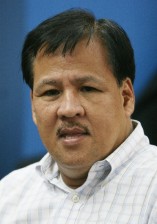Robredo on Arroyo: Poetic justice

Interior Secretary Jesse Robredo
MANILA, Philippines – “Poetic justice” played a part in the pains now suffered by Gloria Macapagal-Arroyo, whose arrest in a hospital on Friday punctuated a series of dramatic showdowns between the executive and the judiciary, Interior Secretary Jesse M. Robredo said.
He said what was happening to Arroyo could be considered a form of moral retribution, considering that the watch list order that had been used by the Department of Justice to justify blocking her from traveling abroad, ostensibly for medical reasons, had been formulated during her term.
“You could say it’s poetic justice. Everything is coming back to her now,” Robredo said of the former President, now a Pampanga representative in the lower house of Congress.
Robredo cited the case of Yogie Martirizar, who, as reported by journalist Raissa Robles in her blog, had been prevented for years by the Arroyo government from traveling abroad on the strength of a similar watch list order.
Martirizar, as it turned out, had the same calcium deficiency disorder as Arroyo, Robles said in her blog, quoting the woman’s lawyer Nena Santos.
Article continues after this advertisementRobredo said Arroyo’s defenders should be asked why she should now enjoy a privilege she herself had denied an ordinary person under virtually the same circumstances.
Article continues after this advertisementBut he clarified this was not the primary reason the executive had taken a position contradictory to that of the Supreme Court, which earlier issued a temporary restraining order (TRO) to stop the DoJ from enforcing the watch list order on Arroyo.
The TRO, the conditions for the issuance of which turned out to have not been met by the Arroyo camp, was rendered moot when a joint DoJ-Commission on Elections panel filed an electoral sabotage case against her at the Pasay City regional trial court.
A Pasay judge then issued a warrant for the arrest of Arroyo and two others charged in the case, prompting the police to serve the warrant on her in the hospital. The Supreme Court said its TRO still stood but conceded Arroyo could no longer leave.
Robredo said he attended two Cabinet-level meetings on the Arroyo situation, and that President Aquino had only instructed his Cabinet secretaries to ensure “fair process.”
“There was nothing about giving her a hard time. That was never the intention. The President only asked us to be fair to her and follow the process,” he said.
He said his department, and consequently, the PNP, which is under its supervision, had decided to take the executive’s position upon consulting legal minds about what to do in situations when there was disagreement between the executive and the judiciary.
“It’s not just a question of taking a unified position. It’s about the process,” he said, noting that the Arroyo camp had apparently not even complied with one of three conditions set by the Supreme Court for its issuance of the TRO that allowed her to travel.
On that technicality alone, he said, Justice Secretary Leila de Lima was justified in not adhering to the Supreme Court’s TRO, as it turned out not to be valid after all.
Robredo said the technicality was part of the process, and that while others might interpret it as nothing more than a legal loophole, “what is good for the goose is good for the gander.”